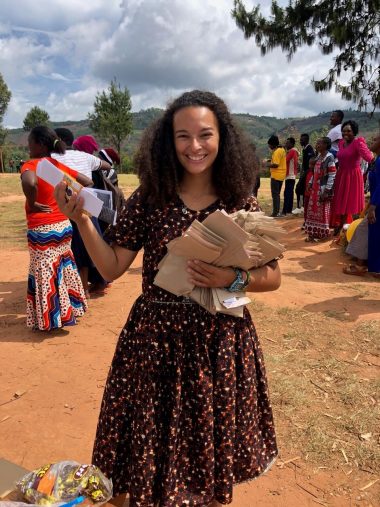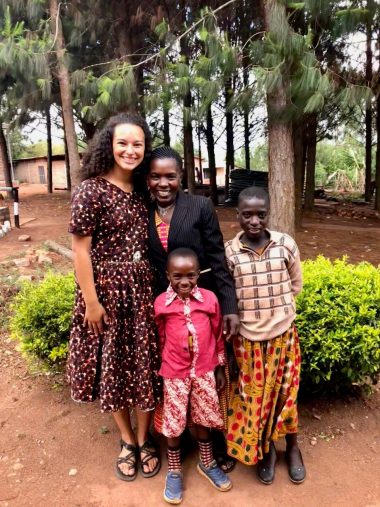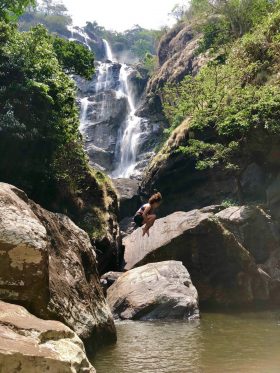Engagement Scholarships open the door to life-changing global studies opportunities for students, a priority of the Elon LEADS fundraising campaign.
The first time Holly Miranda '20 proposed a Global Study experience in Africa, she didn’t get the answer she was hoping to receive. Miranda, then a sophomore from Hampton, New Hampshire, wanted to participate in an independent study in Kenya.
 The answer to her request was no, and with good reason. “The (U.S.) State Department flagged Kenya because of its security status and it was considered to be an unsafe place to go. We had to say no to her going there,” explained Woody Pelton, Elon’s dean of global education. “But her interest in Kenya clued me in that she was willing to go off the beaten track, and Africa was a destination she was interested in taking on.”
The answer to her request was no, and with good reason. “The (U.S.) State Department flagged Kenya because of its security status and it was considered to be an unsafe place to go. We had to say no to her going there,” explained Woody Pelton, Elon’s dean of global education. “But her interest in Kenya clued me in that she was willing to go off the beaten track, and Africa was a destination she was interested in taking on.”
While Miranda, a double major in public health and global and international studies, was revising her plans to spend the fall of 2018 in New Zealand, Pelton saw another option. Elon works with the Council on International Educational Exchange, a nonprofit based in the United States that promotes international study. Pelton is called upon to conduct a site evaluation for CIEE in different exchange nations. He tours the facilities and housing; monitors the courses; speaks to students and gets a feel for how strong the academic and cultural experiences are. Equally important, Pelton makes sure it’s a safe region for students to spend a semester.
When Pelton conducted an evaluation of the program in Iringa, Tanzania, Miranda came to mind right away. He thought it would be an exceptional program for a student interested in public health or health and human services.
“Because I had done the site evaluation, I knew the staff there and spent time with them. I felt personally safe wandering around. I met with the students there, all were women, and they felt safe walking around,” Pelton says. “Knowing the staff there in the community, I thought it would be a great opportunity for Holly.”
After a brief conversation with Pelton, Miranda agreed. “I walked out set on going to Tanzania. It turned out to be a perfect fit for my majors, and reaffirmed my desire to do Peace Corps after graduation and work in international aid and public health,” she said.
That’s how Holly Miranda became among the few Elon students to study in the East African nation. She immersed herself in learning, not only a new language unknown to her at the start, but a different culture, while conducting research and volunteering as a tutor and village health volunteer. While there, the first-generation college student took on three of the five Elon Experiences (global study, undergraduate research and service learning), all made possible through her Elon Engagement Scholarship.
She had some fun, too.
Learning the language immediately
Miranda traveled to Tanzania with five other students, all from different universities. Their studies began in Dar, where they landed, continued to Iringa, a city of about 200,000, and ended in a village where the students lived with host families. Most of those around them spoke little to no English. Swahili is the primary language in Iringa and the village of Kidete.
 In order for the students to successfully study and embed in a Tanzanian village, the first lessons were in Swahili. Shortly after landing in Dar, the language lessons began. Orientation included the first language lesson, as Miranda wrote in the first-week entry of her online diary.
In order for the students to successfully study and embed in a Tanzanian village, the first lessons were in Swahili. Shortly after landing in Dar, the language lessons began. Orientation included the first language lesson, as Miranda wrote in the first-week entry of her online diary.
“We had our first Swahili lesson. It was interesting. The mouth movements and sounds for Swahili are different from English or French, which will take some time to overcome,” she wrote. “However, now five days in with daily lessons and being constantly surrounded by the language, I’m starting to pick up on key words and can engage others with greetings.”
After a few days in Dar, studying the language and visiting museums, Miranda and the other students made the 11-hour trip to Iringa where they stayed in housing at Ruaha Catholic University. For Miranda, the view during the long ride was worth it. The route winds through a national park where the students could see elephants, giraffes, zebras, gazelles and baboons in their natural habitat — a sight that would become familiar throughout the semester.
Classes began the second week. Coursework for the semester meant more studies in Swahili; History of East Africa; Research Methods; Pre-History, Myths and Religions of East Africa; and Poverty Analysis for Socio-economic Development. All of the courses laid the foundation for Miranda’s research project, which focused on the roles of traditional healers, religious healers and Western medicine on lower respiratory tract infections. Miranda says she was particularly interested in what mode of treatment villagers preferred.
“I learned what it takes to create a research project and lead it on my own while learning a new culture and language,” she said. “I conducted all of my research in Swahili, and it was empowering to discover that I could do it.”
In a blog post she explained her research project selection. “I chose to focus on lower respiratory tract infection because it is one of the top causes of death (pre-mature and not) in Africa as a whole. As for treatment, religious and traditional healing is still widely practiced in rural settings.”
Miranda found a mixture of modern convenience and old local customs in Tanzania. Sundays in Iringa featured an excursion to nearby sites such as prehistoric rock formations, national parks or waterfalls. At night they ordered Italian food from Mama Iringa’s and watched American movies on Netflix. But the students also followed old traditions. They washed clothes by hand in huge sinks.
“I brought my handy-dandy multipurpose bucket with me, a package of laundry soap and went to work. It was really satisfying hanging the laundry outside and watching it say in the wind. Gave me some major ‘Little House on the Prairie’ vibes. I’ll never complain about washing machines at Elon again,” Miranda wrote.
Taking it all in
 At about the time Elon students were weathering and cleaning up after Hurricane Florence back home, Miranda was busy with her research proposal, poverty surveys, interview guides, focus group discussions and mid-term exams. The whirlwind of activity was a prelude to living with a Tanzanian family where she completed her undergraduate research and was a part of village life.
At about the time Elon students were weathering and cleaning up after Hurricane Florence back home, Miranda was busy with her research proposal, poverty surveys, interview guides, focus group discussions and mid-term exams. The whirlwind of activity was a prelude to living with a Tanzanian family where she completed her undergraduate research and was a part of village life.
The essence of the global study experience takes students out of their comfort zones and offers them opportunities to face new challenges and grow. Miranda not only toured the countryside, but took the occasional cooking class. Her most exciting experience in Tanzania was hiking 9 kilometers up Tanzania’s highest waterfall in Udzungwa National Park and swimming in the basin.
“I had never seen a waterfall in person. When we finally reached the first swimming hole, I was in awe of the water falling down 200 meters from the ledge above us. I am a poor swimmer, to say the least, and I was not going to swim in the pool. However, my group (lovingly) peer-pressured me into swimming. I’m so glad they did, because the experience was like nothing else I had ever done,” Miranda wrote.
Over fall break, the students visited Zanzibar, including a UNESCO World Heritage Site, Prisoner Island, where they fed giant tortoises, some more than 100 years old, and a former slave market.
Living village life
The final part of the semester was the toughest and most rewarding, Miranda says. In preparation for her research in the village, she visited traditional healers who used herbs to treat broken bones. She had the chance to speak to those being treated. Afterward, she took a three-hour drive — much of it off-road — to her host family in the village of Kidete. The father was a teacher in a neighboring village school and the mother was a farmer. Miranda referred to them as “Baba” and “Mama” and called the two children still living at home “brother” and “sister.”
Miranda spoke Swahili the majority of the time as she helped with household chores and worked on her academic projects in the village where everyone thought she was a doctor. Working with a research assistant, Miranda estimated that she walked about seven miles a day as she talked to villagers about illness and healing.
“It was interesting seeing how different people in the older population and mothers would use traditional healing before going to a Western medical clinic. They believe the traditional is more holistic and Western medical clinics are more expensive,” Miranda says. “It was interesting that all three approaches are used and all three work in harmony with one another. What surprised me was the significance of traditional healing in their culture.”
Life in the village was challenging. There were few modern conveniences. Water was available through a common village spigot and hauled in with buckets.
Miranda’s research progress slowed for several days after she was diagnosed with Typhoid, one of the leading causes of death in developing countries and not uncommon in East Africa. Miranda was vaccinated against the disease before she left and still contracted it.
“I have no clue how I got it and never will,” Miranda wrote. “All I know is count your blessings for our mostly safe drinking water in the U.S.”
Miranda recovered in time for the final week of service in the village. She and another student worked on a community project that added two swingsets to a secondary school. On another day they played familiar childhood games with elementary school students and also administered and graded exams. She also helped teach and practice English with students in a secondary school. The week closed with a Community Day featuring a soccer tournament and singing and dancing competitions. Because it was World AIDS Day, Miranda helped with HIV/AIDS testing and took on the job of passing out information about the disease and condoms to help fight its spread. This was essential in a village where 25 to 30 percent of residents are impacted by the disease.
Miranda wrote that it was bittersweet to leave the village and that she had been changed by her experience. “I feel I have grown so much as a person over this short time,” she says.
Looking back from home
After returning to Elon in January, Miranda was regularly asked about her experiences in Tanzania. While she’s one of the few Elon students who have visited that country, she won’t be the last. Two more Elon students plan to study there in the fall. “That’s largely because of Holly,” Pelton says.
Miranda doesn’t grow tired of talking about her Elon Experiences in Africa. It was a multi-dimensional learning opportunity that informed every aspect of her life now and for a lifetime. Elon’s Global Education programs most frequently change a student’s view of the world and leave them with a hunger for more exploration. It did for Miranda.
“Going from a country of extreme wealth to the polar opposite was eye-opening as to my own privilege of having clean water and access to high-quality education. Most of the people, a vast majority of Tanzanians, will drop out of school. It allowed me to reflect on what I have in my life and what I can cut out,” she says. “It helped break stereotypes about the continent of Africa. My parents were really terrified of my going to Tanzania. But we did have access to cell services. We did have WiFi. Pizza is available if I want it. It’s a fully functioning society. It’s just different.”
Miranda’s service and work in Africa in the fall of 2018 was made possible by her Elon Engagement Scholarship, which is one of the top priorities of the Elon LEADS Campaign. Her experiences strengthened her desire to join the Peace Corps after graduation and ultimately work in international aid.
She also has been energized by mentors at Elon who are encouraging her to apply for a Fulbright Scholarship as well.
“As a first-generation college student, I try to squeeze every last drop of goodness from these experiences. This tremendous once-in-a-lifetime experience would not be possible without support from the Elon Engagement Scholarship.”
About The Elon LEADS Campaign
Engagement Scholarships are a priority of the Elon LEADS Campaign. The university launched the public phase of the campaign on April 5. With a $250 million goal, Elon LEADS is the largest fundraising campaign in the university’s history and will support four main funding priorities: scholarships for graduates the world needs, access to engaged-learning opportunities, support for faculty and staff mentors who matter and our iconic campus. To date, donors have contributed $168 million toward the overall goal.
Every gift to the university—including annual, endowment, and estate and other planned gifts—counts as a gift to the campaign, which will support students and strengthen Elon for generations to come. To learn more about how you can make an impact, visit www.elonleads.com.


